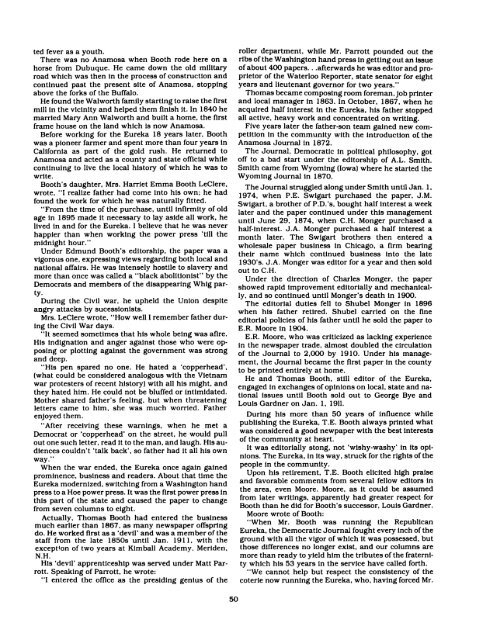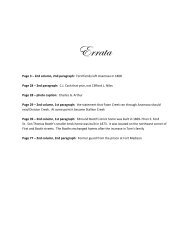Anamosa - A Reminiscence 1838 - 1988
The definitive history of the community of Anamosa, Iowa, USA
The definitive history of the community of Anamosa, Iowa, USA
You also want an ePaper? Increase the reach of your titles
YUMPU automatically turns print PDFs into web optimized ePapers that Google loves.
ted fever as a youth.<br />
There was no <strong>Anamosa</strong> when Booth rode here on a<br />
horse from Dubuque. He came down the old military<br />
road which was then in the process of construction and<br />
continued past the present site of <strong>Anamosa</strong>, stopping<br />
above the forks of the Buffalo.<br />
He found the Walworth family starting to raise the first<br />
mill in the vicinity and helped them finish it. In 1840 he<br />
married Mary Ann Walworth and built a home, the first<br />
frame house on the land which is now <strong>Anamosa</strong>.<br />
Before working for the Eureka 18 years later, Booth<br />
was a pioneer farmer and spent more than four years in<br />
California as part of the gold rush. He returned to<br />
<strong>Anamosa</strong> and acted as a county and state official while<br />
continuing to live the local history of which he was to<br />
write.<br />
Booth‘s daughter, Mrs. Harriet Emma Booth LeClere.<br />
wrote. "I realize father had come into his own: he had<br />
found the work for which he was naturally fitted.<br />
"From the time of the purchase. until infirmity of old<br />
age in 1895 made it necessary to lay aside all work, he<br />
lived in and for the Eureka. I believe that he was never<br />
happier than when working the power press ‘till the<br />
midnight hour."<br />
Under Edmund Booth‘s editorship. the paper was a<br />
vigorous one. expressing views regarding both local and<br />
national affairs. He was intensely hostile to slavery and<br />
more than once was called a “black abolitionist" by the<br />
Democrats and members of the disappearing Whig party.<br />
During the Civil war, he upheld the Union despite<br />
angry attacks by sucessionists.<br />
Mrs. LeClere wrote, “How well I remember father during<br />
the Civil War days.<br />
"It seemed sometimes that his whole being was afire.<br />
His indignation and anger against those who were opposing<br />
or plotting against the government was strong<br />
and deep.<br />
"His pen spared no one. He hated a 'copperhead‘.<br />
(what could be considered analogous with the Vietnam<br />
war protesters of recent history) with all his might, and<br />
they hated him. He could not be bluffed or intimidated.<br />
Mother shared father's feeling, but when threatening<br />
letters came to him, she was much worried. Father<br />
enjoyed them.<br />
"After receiving these warnings, when he met a<br />
Democrat or ‘copperhead‘ on the street, he would pull<br />
out one such letter, read it to the man, and laugh. His audiences<br />
couldn't ‘talk back‘, so father had it all his own<br />
way.“<br />
When the war ended, the Eureka once again gained<br />
prominence, business and readers. About that time the<br />
Eureka modernized, switching from a Washington hand<br />
press to a Hoe power press. It was the first power press in<br />
this part of the state and caused the paper to change<br />
from seven columns to eight.<br />
Actually, Thomas Booth had entered the business<br />
much earlier than 1867. as many newspaper offspring<br />
do. He worked first as a ‘devil’ and was a member of the<br />
staff from the late 1850s until Jan. 1911, with the<br />
exception of two years at Kimball Academy, Meriden,<br />
N.H.<br />
His ‘devil‘ apprenticeship was served under Matt Parrott.<br />
Speaking of Parrott, he wrote:<br />
“I entered the office as the presiding genius of the<br />
roller department. while Mr. Parrott pounded out the<br />
ribs of the Washington hand press in getting out an issue<br />
of about 400 papers. . .afterwards he was editor and proprietor<br />
of the Waterloo Reporter. state senator for eight<br />
years and lieutenant governor for two years.“<br />
Thomas became composing room foreman. job printer<br />
and local manager in 1863. In October. 1867, when he<br />
acquired half interest in the Eureka, his father stopped<br />
all active. heavy work and concentrated on writing.<br />
Five years later the father-son team gained new competition<br />
in the community with the introduction of the<br />
<strong>Anamosa</strong> Journal in 1872.<br />
The Journal, Democratic in political philosophy, got<br />
off to a bad start under the editorship of A.L. Smith.<br />
Smith came from Wyoming (Iowa) where he started the<br />
Wyoming Journal in 1870.<br />
The Journal struggled along under Smith until Jan. 1.<br />
1974, when P.E. Swigart purchased the paper, J.M.<br />
Swigart. a brother of P.D.'s, bought half interest a week<br />
later and the paper continued under this management<br />
until June 29. 1874. when C.H. Monger purchased a<br />
half-interest. J.A. Monger purchased a half interest a<br />
month later. The Swigart brothers then entered a<br />
wholesale paper business in Chicago, a firm bearing<br />
their name which continued business into the late<br />
1930's. J.A. Monger was editor for a year and then sold<br />
out to C.H.<br />
Under the direction of Charles Monger. the paper<br />
showed rapid improvement editorially and mechanicaliy.<br />
and so continued until Monger's death in 1900.<br />
The editorial duties fell to Shubel Monger in 1896<br />
when his father retired. Shubel carried on the fine<br />
editorial policies of his father until he sold the paper to<br />
E.R. Moore in 1904.<br />
E.R. Moore, who was criticized as lacking experience<br />
in the newspaper trade, almost doubled the circulation<br />
of the Journal to 2,000 by 1910. Under his management.<br />
the Journal became the first paper in the county<br />
to be printed entirely at home.<br />
He and Thomas Booth. still editor of the Eureka,<br />
engaged in exchanges of opinions on local. state and national<br />
issues until Booth sold out to George Bye and<br />
Louis Gardner on Jan. 1, 1911.<br />
During his more than 50 years of influence while<br />
publishing the Eureka. T.E. Booth always printed what<br />
was considered a good newpaper with the best interests<br />
of the community at heart.<br />
It was editorially stong, not ‘wishy-washy‘ in its opinions.<br />
The Eureka, in its way, struck for the rights of the<br />
people in the community.<br />
Upon his retirement, T.E. Booth elicited high praise<br />
and favorable comments from several fellow editors-in<br />
the area. even Moore. Moore, as it could be assumed<br />
from later writings, apparently had greater respect for<br />
Booth than he did for Booth‘s successor, Louis Gardner.<br />
Moore wrote of Booth:<br />
"When Mr. Booth was running the Republican<br />
Eureka, the Democratic Journal fought every inch of the<br />
ground with all the vigor of which it was possessed, but<br />
those differences no longer exist, and our columns are<br />
more than ready to yield him the tributes of the fraternity<br />
which his 53 years in the service have called forth.<br />
“We cannot help but respect the consistency of the<br />
coterie now running the Eureka. who, having forced Mr.<br />
50



